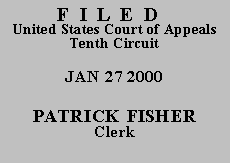

| RICK L. STARNES,
vs.
GARY GIBSON |
|
Although Mr. Starnes raised several claims before the district court, he only raises the question of double jeopardy in this appeal.(1) Specifically, he claims that the Double Jeopardy Clause of the Fifth Amendment is implicated by the prosecution of (a) Counts I and II after a guilty plea to Count III; (b) Counts I and II after a guilty plea to Count IV; and (c) either Count I with Count II or Count II with Count I. Moreover, Mr. Starnes claims that prosecution on the various counts and forfeiture of his truck violates double jeopardy.
The first question in double jeopardy claims involving conduct which violates more than one statutory provision is whether the legislature clearly intended each violation to be punished as a separate crime. See Garrett v. United States, 471 U.S. 773, 778 (1985). If this question is answered in the affirmative, there is no double jeopardy violation. See United States v. Lanzi, 933 F.2d 824, 825 (10th Cir. 1991). However, if legislative intent is unclear, we then apply the test enunciated in Blockburger v. United States, 284 U.S. 299 (1932). "The applicable rule is that where the same act or transaction constitutes a violation of two distinct statutory provisions, the test to be applied to determine whether there are two offenses or only one, is whether each provision requires proof of a fact which the other does not." Id. at 304. So long as each crime requires proof of different elements, there is no constitutional violation. See United States v. Rodriguez-Aguirre, 73 F.3d 1023, 1025 (10th Cir. 1996).
In the instant case, the Oklahoma legislature clearly intended that violation of a protective order should be punished as a separate crime from the underlying offense. See Okla. Stat. tit. 22, § 60.6(C)(3) (punishment for violation of a protective order "shall not affect the applicability of Sections 644, 645, 647 and 652 of Title 21 of the Oklahoma Statutes."); Taylor v. Oklahoma, 881 P.2d 755, 759 (Okla. Crim. App. 1994). Thus, double jeopardy was not violated by trying Counts I and II after a guilty plea to Count III.
Application of the Blockburger test to the rest of Mr. Starnes' claims reveals that each count requires proof of different elements. There is no double jeopardy between either Counts I or II and IV (only Counts I and II require discharge of a firearm or use of a dangerous weapon; only Count IV requires proof of the destruction of property); or between Counts I and II (only Count I requires intent to injure; only Count II requires use of a vehicle to facilitate the crime).
As to Mr. Starnes' final claim, civil forfeiture simply does not implicate the Double Jeopardy Clause. See United States v. Ursery, 518 U.S. 267, 270 (1996); see also United States v. Williams, 118 F.3d 717, 718 (10th Cir. 1997).
We DENY the request for a certificate of appealability and DISMISS the appeal.
Entered for the Court
Paul J. Kelly, Jr.
Circuit Judge
*. This order and judgment is not binding precedent, except under the doctrines of law of the case, res judicata, and collateral estoppel. This court generally disfavors the citation of orders and judgments; nevertheless, an order and judgment may be cited under the terms and conditions of 10th Cir. R. 36.3.
**. After examining the briefs and the appellate record, this three-judge panel has determined unanimously that oral argument would not be of material assistance in the determination of this appeal. See Fed. R. App. P. 34(a); 10th Cir. R. 34.1 (G). The cause is therefore ordered submitted without oral argument.
1.Mr. Starnes appellate pleadings could be interpreted, with our mandated liberal construction, as raising two other challenges as well: (1) sufficiency of the evidence to support Count II, and (2) district court error in allowing the prosecutor to comment on evidence (the shotgun) which was not introduced during trial. However, these claims were not raised before the district court and, as there are no extraordinary circumstances present which would militate otherwise, we will not address them for the first time on appeal. Smith v. Secretary of N.M. Dep't of Corrections, 50 F.3d 801, 814 n.22 (10th Cir. 1995).